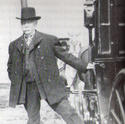Nobel Prize-winning economist Paul Krugman was quoted widely for saying that the official recession will end this summer. Before you get overly excited, keep in mind that the recession he’s calling the end of started officially in December 2007. Now ask yourself this: when did you notice that the economy was in recession? Six months after it started? One year? read more »
Politics
Britain's Labour Lessons For Obama
LONDON - The thrashing of Britain's New Labour Party – which came in a weak third in local and European Parliament elections this week – may seem a minor event compared to Barack Obama's triumphal overseas tour. Yet in many ways the humiliation of New Labour should send some potential warning shots across the bow of the good ship Obama. read more »
- Login to post comments
The Gambler King of Clark Street, the Origin of Chicago's Political Machine
Long before Chicago sold off its assets, made plastic cows parade and outlawed goose guts, there was Michael Cassius McDonald, Big Mike. Where the Chicago Machine now grinds the citizen with Progressive idiocies, Mike McDonald and other Machine Mavericks like the Lords of the Levee appeared to actually help people. Vice and Government have gone hand-in-hand since Solon tried to reason with Croesus – Hesiod tells us that political corruption sparks political thought. The life of Michael Cassius McDonald was active and thought-provoking. read more »
Painting the Town White: Technology and Greenhouse Gas Emissions
“Paint the world white to fight global warming” was the astonishing headline from The Times of London. The paper was referring to a presentation made by United States Secretary of Energy, Dr. Stephen Chu at the St. James Palace Nobel Laureate Symposium last week. Chu was reported as saying that that this approach could have a vast impact. read more »
- Login to post comments
The Real Mayor of Chicago
Most Americans living outside the Chicago area identify the city with Oprah, Obama, or Michael Jordan. When the subject of who really runs Chicago comes up, most people would say Mayor Daley. Chicago's lack of term limits and persistent political machine have kept Mayor Daley in office for over 20 years.
Those who know Chicago politics know there's one man who's more powerful than Mayor Daley, Alderman Ed Burke. Mayor Daley may be the identifiable public face of Chicago's political system and act as a lightning rod for criticism, but the lower profile Alderman Burke wields the real power. read more »
San Jose, California: Bustling Metropolis or Bedroom Community?
Dionne Warwick posed the question more than 40 years ago, yet most Americans still don’t know ‘The way to San Jose’. Possessing neither the international cachet of San Francisco nor the notoriety of Oakland, San Jose continues to fly under the national radar in comparison to its Bay Area compatriots. Even with its self-proclaimed status as the ‘Heart of Silicon Valley’, many would be hard pressed to locate San Jose on a map of California. read more »
Stimulus Alert Stretches From the Center of L.A. to Suburban Atlanta
The hundreds of millions of dollars in federal stimulus money are working their way through various systems, en route to a city near you.
Give President Barack Obama credit for acting boldly to pump the funds into the economy – or take him to task for printing up money on the cuff.
Either way, the time has come to shift your focus from Washington, D.C., and onto State Houses and City Halls throughout our land. read more »
Project Development: Regulation and Roulette
The site plan logically should be the key to approval of a development project. Yet in reality, the plan is secondary to the presentation. My conclusions are based upon experience with well over a thousand developments over four decades, most in the mainland USA. And what I’ve observed is that the best site plan is only as good as the presentation that will convince the council or planning commission to vote “Yes” on it. No “yes” vote, no deal, no development. read more »
- Login to post comments
The Changing Landscape of America: The Fate of Detroit
INTRODUCTION
During the first ten days of October 2008, the Dow Jones dropped 2399.47 points, losing 22.11% of its value and trillions of investor equity. The Federal Government pushed a $700 billion bail-out through Congress to rescue the beleaguered financial institutions. The collapse of the financial system in the fall of 2008 was likened to an earthquake. In reality, what happened was more like a shift of tectonic plates.
In 1912 a German scientist, Alfred Wegener, proposed that the continents were once joined together as one giant land mass called Pangea. read more »
Can California Make A Comeback?
These are times that thrill some easterners' souls. However bad things might be on Wall Street or Beacon Hill, there's nothing more pleasing to Atlantic America than the whiff of devastation on the other coast.
And to be sure, you can make a strong case that the California dream is all but dead. The state is effectively bankrupt, its political leadership discredited and the economy, with some exceptions, doing considerably worse than most anyplace outside Michigan. By next year, suggests forecaster Bill Watkins, unemployment could nudge up towards an almost Depression-like 15%. read more »






















